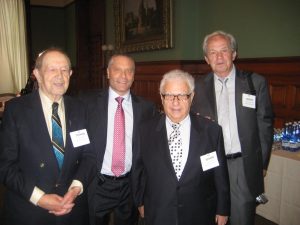Nazis have just invaded France and the German army is encroaching upon Marseilles. Our protagonist, Georg – a lisping, haunted man in his early 20s whose head whips nervously at every police siren – sits in a café to meet a friend who says he can provide him with a boat ticket to Mexico. But there’s a catch: Georg needs to deliver a letter to a writer named Weidel, who, like Georg and his friend, is a Jewish refugee.
That’s roughly the opening to Transit Visa, a loosely autobiographical historic novel by Anna Seghers that was written in 1944. More than 70 years later, German writer-director Christian Petzold uses this same introduction in his film, Transit, which debuted at the Toronto International Film Festival this year and opens in cinemas across Canada later this month.
But Petzold’s adaptation has a twist: Georg’s story takes place in 2018.
However, his adaptation doesn’t rewrite the novel much. There are no smartphones or flat-screen TVs, nor is there any hint of the Internet, social media or even a computer. Technologically, though the cars and clothes are modern, this world seems as advanced as the 1940s: Georg is a trained TV and radio technician and he shows off his skills with a young boy’s busted transistor radio. When he finds a manuscript, it looks as if the author wrote it up on a typewriter.
It’s a brilliant conceit for two reasons. Firstly, considering Petzold initially considered directing a straight period-piece adaptation, I imagine the film’s producers breathed a sigh of relief in realizing how much they’d save in costume and set design costs.
But more importantly, the concept creates immediate empathy among the audience, which is rare for Holocaust films. This is a 21st-century refugee story – except these refugees are white Jews who are passable for locals, unless asked for their identity papers by stone-faced cops. Transit pushes well beyond its concept, engrossing audiences with a compassionate Holocaust allegory that blatantly condemns the rise of anti-immigrant populism throughout the West.
In promotional materials for the movie, Petzold denounces historical cinema as a “safe zone,” which I take to mean a genre that blunts contemporary criticism by encouraging audiences to shake their heads at the hateful decisions of dead, misguided souls. To him, the political climate of modern-day Europe is not so different from how it was in the early 1940s. Many still fear refugees entering their countries illegally, stealing jobs and harming innocent citizens.
Petzold doubles down on this approach by glossing over details, naturally crafting a kind of hush-hush atmosphere. For the first 30 minutes, nobody even utters the word “Jew.” Indeed, if you didn’t know 20th-century history, the whole concept might fly over your head entirely.
Throughout the film, Georg meets a North African mother and son, a desperately lonely orchestra conductor, a resentful upper-class woman and a doctor crippled by unrequited love, among others – all of whom feel desperately lonely and eager to share their stories before it’s too late.
READ: A TALE OF TWO KINDERGARTEN TEACHERS
At just 100 minutes, Transit sometimes feels longer than it is. But it also gives Petzold breathing room to involve such side characters and meander from the main story. Georg meets many of them in almost surreal circumstances: one mysterious woman keeps reappearing, tapping him on the shoulder hopefully, then turning away in disappointment. Her reasoning is revealed eventually, and it’s a wonderfully subdued revelation for the audience. But it’s a slow burn to get there.
There’s a delicacy to all Holocaust films. Filmmakers may rightly play it safe in respecting historic and personal facts, not wanting to embellish for the sake of drama in telling a story that’s already so heavy by nature. That makes Transit all the more refreshing. In a genre saturated with biographical narratives and war stories, this ranks as one of the sharpest Holocaust allegories of modern cinema.
Transit opens between Nov. 9 and 23 in theatres across Canada.
Author

Michael is currently the director of The CJN's podcast network, which has accumulated more than 2 million downloads since its launch in May 2021. Since joining The CJN in 2018 as an editor, he has reported on Canadian Jewish art, pop culture, international travel and national politics. He lives in Niagara Falls, Ont., where he sits on the board of the Niagara Falls Public Library.
View all posts







